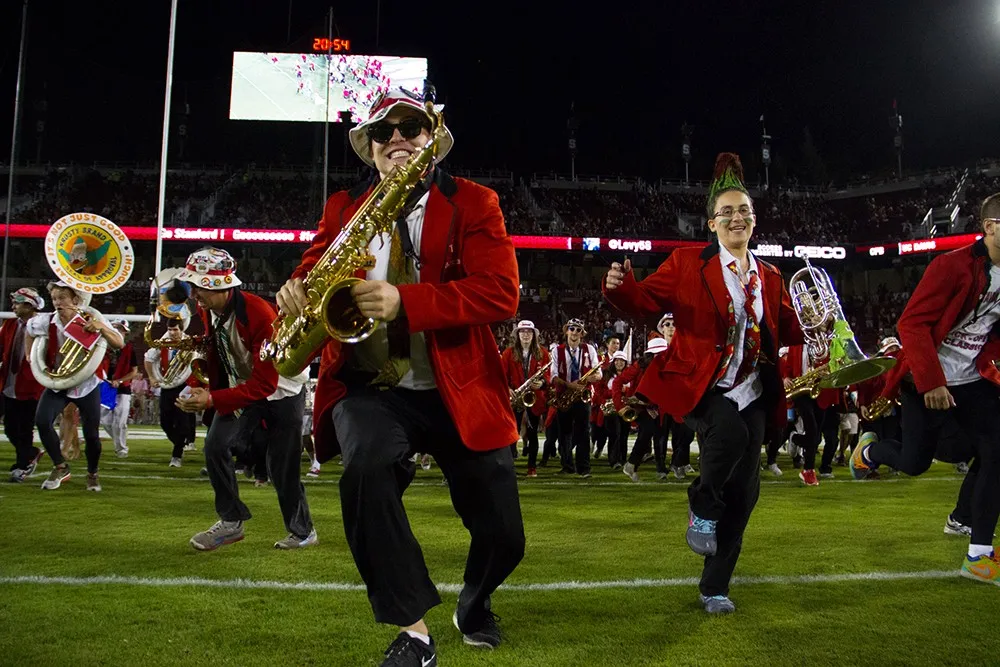Table of Contents
Stanford announced today that it will suspend the Band for the 2016-17 school year. A group run by a professional music director and university-organized committee will replace the wildly irreverent student-run organization, one of Stanford’s best-loved traditions.
Stanford used minor procedural infractions to push their regulatory agenda down the Band’s throat. A letter from Vice Provost Greg Boardman cited “systemic cultural problems” and consistent “disregard for university policies and directives” to explain his decision: Band’s alleged misdemeanors include violating an alcohol suspension by buying pitchers at Treehouse, showing up drunk to rollouts, and violating a travel ban by using Band funds to rent a cabin at Lake Tahoe. Band members have disputed all of these claims to the Review.
Though Boardman’s statement praised the Band’s “irreverence” and “exuberance,” and he may have saved the Band from harsher punishments recommended by the Organization Conduct Board, his criticisms of the organization revealed that the Stanford administration actually cares little for the Band’s place in campus culture. As has been true for the past two years, Stanford’s treatment of the Band is both unnecessarily punitive and inconsistent with that of other student groups.
The Band is neither the first or last student group to get pitchers at Treehouse. A Band member who insisted on anonymity for fear of university backlash stated that, as expected, drinks at Treehouse were hardly wild: “Before rehearsal, certain sections grab dinner at Treehouse, and some people order beer with their meals.” Pitchers do not create an alcoholic culture. If they do, we cordially invite Dr. Boardman to disband the Stanford Review. Band members also strongly dispute the allegations of drunk rollouts. Meanwhile, alcohol flows in excess at university-approved frat parties and freshman dorms almost every weekend of the academic year. Enforcement of the hard alcohol policy has been laughable.
And yet, only the band was singled out for “disregard of university policies and directives”. Sam Weyen, the Stanford Tree, told us that “the Band is being held to a standard to which no other organization has ever had to comply.” Boardman claims that “the outstanding issues have not been taken seriously by the Band or its leadership” – but in reality, the Band has continually worked to comply with the Title IX office’s continuous and seemingly arbitrary requests. It has filled out “travel petitions” to play at away games, even though approval was often given only a few weeks in advance. It gave consent and alcohol training for its members at the university’s insistence – and was then asked for five separate follow-ups and separate training for freshmen.
Similarly, the Band complied with the Title IX office in changing its “Dollie Day” by bringing Student Affairs staff to the event. These efforts were nonetheless deemed inadequate when the Band did not provide a “written evaluation” of its efforts. A junior in the Band described this absurdity best: “Draw a line so tight around Band, set the standard such that any of its members gathered together, even in a non-Band context, can incur a severe penalty, and the line will without question be crossed.”
These efforts do not erase the Band’s past missteps. Its past actions on other university campuses have discredited Stanford and disrespected other universities’ values. However, no 2011-2012 Band member is still an undergraduate. The current Band lineup is being punished for actions in which they did not participate while being denied credit for their own positive contributions.
As another senior Band member told the Review, “We’ve made an amazing amount of changes. The culture shift in the last two years has been incredible. But [the administrators] don’t see it.” Weyen told us that after the announcement that the LSJUMB could not travel to the Sun Bowl, he “emailed both the head of OCB and Title IX asking to meet in person,” because he was “recommitted to helping prove that our culture was better than or on par with, let’s be real, any other organization on campus. They ignored my emails, and after today I see why.”
“We don’t feel like the administration knows what we’re doing or what we’re about as an organization,” a committed Band member added.
He’s right.
The university’s punishment is clearly unfair. The Band has clearly done more than most student organizations to reform its ways and to comply with university policy. As Boardman frets about “risk and liability to the University community and to Stanford’s reputation”, these concerns have clearly not proved existential threats to Stanford’s brand over the decades. The Band’s most controversial moment was not in 2011, but in 1982 when members stormed the field at the Big Game. And yet, Stanford has still managed to become one of the world’s leading universities in every discipline since then.
Stanford has already taken the axe to most student traditions. The administration has gutted Full Moon on the Quad, rendering it unrecognizable to recent graduates. Enforcement of open membership policies have left Stanford bereft of exclusive, prestigious student organizations. This latest authoritative, arbitrary, and arcane administrative action again the Band proves that Stanford believes seizing control over student group – instead of actually leaving them to students – will somehow improve campus culture. If the administration continues to eviscerate our traditions, what campus culture will even remain?
The Leland Stanford Marching Band is one of the few traditions left that unites an increasingly disparate student body in a celebration of idiosyncratic culture. The university could have pursued a more moderate course of action, but instead chose to make the Band a political scapegoat. At the next game, not only will our hollowed-out “band” be silent. So too will the winds of freedom.





